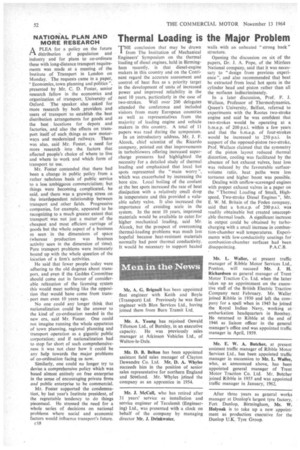NATIONAL PLAN AND MORE RESEARCH A PLEA for a policy on the future
Page 54

If you've noticed an error in this article please click here to report it so we can fix it.
distribution of population and industry and for plans to co-ordinate these with long-distance transport requirements was made at a meeting of the Institute of Transport in London on Monday. The requests came in a paper, Economics, town planning and politics presented by Mr. C. D. Foster, senior research fellow in the economics and organization of transport, University of Oxford. The speaker also asked for more research by both providers and users of transport to establish the best distribution arrangements for goods and the best locations for depots and factories, and also the effects on transport itself of such , things as new motorways and modernized railways. There was also, said Mr. Foster, a need for more research into the factors that affected people's choice of where to live and where to work and which form of transport to use.
Mr. Foster contended that there had been a change in public policy from a rather nebulous basis of public service to a less ambigeous commercialism; but things were becoming complicated, he said, and there was a growing stress on the interdependent relationship between transport and other fields. Progressive companies, for example, appeared to be recognizing to a much greater extent that transport was not just a matter of the cheapest and most efficient carriage of goods but the whole aspect of a business as seen in the dimensions of space (whereas production was business activity seen in the dimension of time). Pure transport problems were intimately bound up with the whole question of the location of a firm's activities.
He said that fewer people today were adhering to the old dogmas about transport, and even if the Geddes Committee should come out in favour of considerable relhxation of the licensing system this would meet nothing like the opposition that would have come from transport men even 10 years ago.
No one could any longer think that nationalization could be the answer to the kind of co-ordination needed in the new era, said Mr. Foster. One could not imagine running the whole apparatus of town planning, regional planning and transport operation as a gigantic public corporation; and if nationalization had to stop far short of such comprehensiveness it was not clear how it could be any help towards the major problems of co-ordination facing us now.
Similarly, one could no longer try to devise a comprehensive policy which was based almost entirely, on free enterprise in the sense of encouraging private firms and public enterprise to be commercial.
Mr. Foster supported the condemnation, by last year's Institute president, of the regrettable tendency to do things piecemeal. He stressed the need for a whole series of decisions on national problems where social and economic factors would influence transport's future.
(18
























































































































